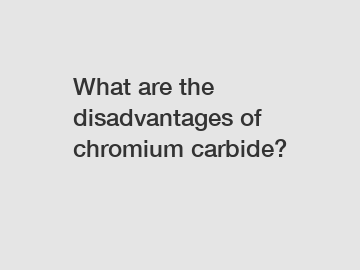What are the disadvantages of chromium carbide?
What are the Disadvantages of Chromium Carbide?
Chromium carbide is a compound that is composed of the elements chromium and carbon. It is known for its exceptional hardness, wear resistance, and ability to withstand high temperatures. Chromium carbide is commonly used in various industrial applications, including welding, coating, and surface treatment. While it offers numerous advantages, it is essential to be aware of its disadvantages as well. In this article, we will discuss some of the disadvantages of chromium carbide and its potential limitations.
1. Limited Oxidation Resistance.

Chromium carbide possesses good resistance to corrosion and oxidation at elevated temperatures. However, it is important to note that continuous exposure to certain environments, such as highly oxidizing atmospheres or strong acids, may lead to the formation of oxides on its surface. These oxides can degrade the material's performance and compromise its overall resistance to corrosion. Therefore, in applications where exposure to such environments is expected, additional protective measures must be considered.
2. High brittleness.
One of the significant disadvantages of chromium carbide is its high brittleness. This material tends to be quite rigid and fragile, making it susceptible to cracking and fracturing under certain mechanical stresses. While it excels in wear resistance, it may not be suitable for applications that require significant impact resistance or flexibility. Careful consideration must be given to the specific requirements of a particular application before choosing chromium carbide as a suitable material.
3. Difficult Machinability.
Another disadvantage of chromium carbide is its difficulty in machining. Due to its exceptional hardness, it can pose challenges when it comes to shaping and forming operations. Specialized cutting tools and techniques are often required to machine chromium carbide effectively. This can result in increased production costs and longer processing times. It is crucial to carefully plan and allocate appropriate resources when machining chromium carbide components.
4. Thermal Shock Susceptibility.
Although chromium carbide offers excellent heat resistance, it is susceptible to thermal shock. Rapid temperature changes can cause expansion and contraction, leading to cracking or material failure. This limitation is particularly relevant in applications where exposure to extreme temperatures or rapid heating and cooling cycles is expected. Thermal management strategies, such as controlled heating or gradual cooling, may need to be implemented to mitigate the risk of thermal shock.
5. Cost Considerations.
Lastly, the cost of chromium carbide can be a disadvantage compared to other materials. While it offers exceptional wear and corrosion resistance, it may not always be the most cost-effective option. The production and processing of chromium carbide can involve complex manufacturing techniques and specialized equipment, contributing to higher expenses. As a result, it is necessary to evaluate the overall cost versus performance trade-off when considering the use of chromium carbide.
In conclusion, chromium carbide offers many advantages, including excellent hardness, wear resistance, and high-temperature performance. However, it is vital to consider its limitations and disadvantages when selecting it for specific applications. These include limited oxidation resistance, high brittleness, difficult machinability, thermal shock susceptibility, and cost considerations. Understanding these drawbacks can help engineers and designers make informed decisions regarding its optimal usage.
If you have any further questions about chromium carbide or its suitability for your specific requirements, please do not hesitate to contact us. Our team of experts is here to assist you and provide guidance in choosing the most suitable materials for your applications.
For more information, please visit hard surfacing welding wire, chrome carbide wear plate supplier, hardfacing materials.
152
0
0


Comments
All Comments (0)